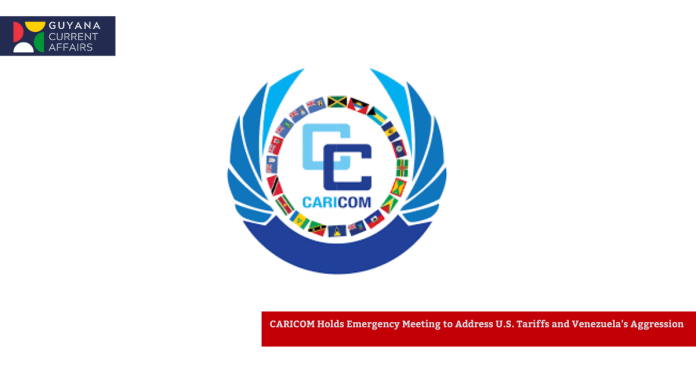In response to pressing regional challenges, the Caribbean Community (CARICOM) convened an emergency meeting to discuss two critical issues: the proposed U.S. tariffs and Venezuela’s recent aggression in Guyana’s waters. The gathering brought together regional leaders to strategize on mitigating the economic impacts of U.S. trade policies and to address the escalating border dispute between Guyana and Venezuela.
U.S. Tariffs: Economic Concerns
The proposed U.S. tariffs on ships and vessels, particularly those made in China, have raised significant concerns among CARICOM nations. President Irfaan Ali of Guyana highlighted the potential for increased transport costs and trade disruptions, emphasizing the need for dialogue with U.S. policymakers to address these challenges. The region views the U.S. as an important partner and is seeking to engage in discussions to mitigate the economic repercussions of these tariffs.
Venezuela’s Aggression: Territorial Integrity
The meeting also focused on Venezuela’s recent incursion into Guyana’s Exclusive Economic Zone (EEZ), where Venezuelan naval vessels approached ExxonMobil’s FPSO platforms. This act was condemned by CARICOM as a provocative incident contrary to international law and the 2023 Argyle Declaration. The regional body reiterated its unwavering support for Guyana’s sovereignty and territorial integrity, calling for the immediate removal of Venezuelan vessels from Guyanese waters.
International Support and Diplomatic Efforts
The U.S. has issued strong warnings to Venezuela, affirming its support for Guyana’s territorial integrity and threatening consequences for further provocation. U.S. Secretary of State Marco Rubio is scheduled to visit the Caribbean, where he will meet with regional leaders, including President Ali, to discuss these pressing issues.
CARICOM Chairman and Barbados Prime Minister Mia Mottley is also seeking a meeting with the White House to address these concerns. The region is committed to finding peaceful resolutions to disputes while maintaining its stance against aggression.
Conclusion
The emergency meeting underscores CARICOM’s proactive approach to addressing regional challenges. By engaging with international partners and reaffirming its commitment to peace and sovereignty, the organization aims to protect the interests of its member states and ensure stability in the Caribbean. As tensions with Venezuela persist and U.S. trade policies evolve, CARICOM’s diplomatic efforts will remain crucial in navigating these complex issues.


